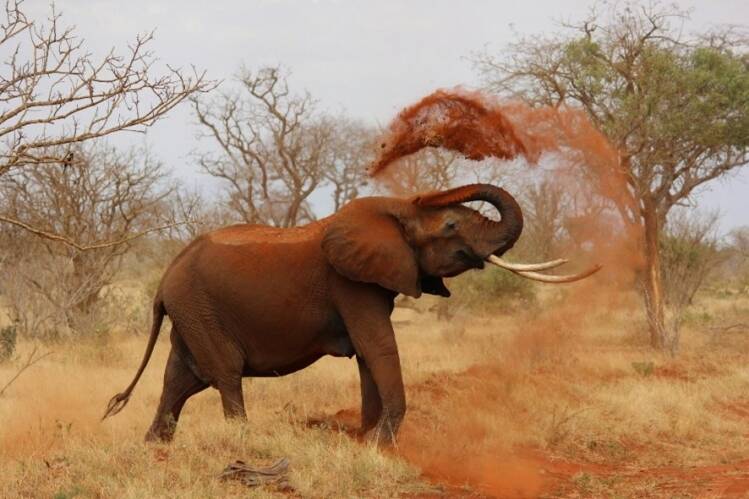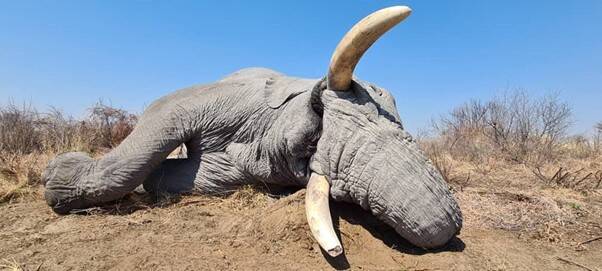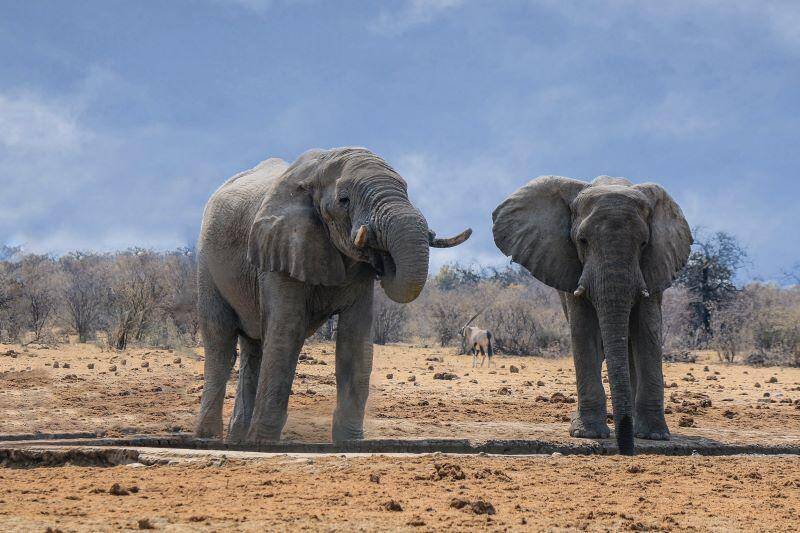For hundreds of years Africa has been considered the mecca of game hunting, dating back to the days of Hemingway and Selous. And before them were the many indigenous inhabitants of the “dark continent” who took to a “hunting safari” as a means of survival, story and status.
The African elephant is the largest land mammal and has been a key target of many African hunts, right from the humble beginnings of game hunting as mentioned above. Elephant hunting in Africa has long since moved on from this to become one of the biggest symbols (if not the biggest) of a great African trophy hunting safari.

[DYNAMIC-BLOGTABLEOFCONTENT]
Why go Elephant Hunting in Africa? Taking on a Giant of the African Hunts
Many of Africa’s game hunting destinations still provide hunters with a true sense of being in the wilderness. Despite burgeoning populations, parts of these elephant hunting safari destinations remain relatively untouched and strictly controlled through established wildlife services and conservation efforts.
The African elephant (Loxodonta Africana) has evolved to suit the conditions in which it lives. They possess a skin measuring over an inch thick to protect it from bites, thorns, and stings; this also means they require a heavier caliber in order to ensure greater success of the hunting safari.
African elephants use their large Africa–shaped ears as a means of keeping cool, flapping them around like fans and moving the air while also exposing blood vessels that lead to further cooling down. This, coupled with their love of a good mud bath, ensures elephants are well adjusted to the heat and blistering African sun.
Elephants are highly intelligent animals and are known to display almost humanlike emotions such as happiness, anger, grief, and excitement. Males over the age of 25 can be very competitive when it comes to breeding due to their size and maturity and bigger males are favored due to producing bigger, stronger calves. Females can give birth every 3–6 years and during the average lifetime can have up to seven or eight calves.
The African elephant is held high as a symbol of strength, power, wisdom, and loyalty. This has led to many African countries adopting the elephant as a part of their national symbols or traditional stories. Certain cultures believed that their chiefs or leaders would be reincarnated as elephants and as such during burial, they were buried with elephant tusks.

Destinations for an African Elephant Hunting Safari and their Requirements
South Africa
Africa’s southernmost country is home to 9 provinces, each with their own game hunting drawcards and offerings. Elephant hunting safari in South Africa typically take place in the Mpumalanga, KwaZulu-Natal (KZN) and Limpopo provinces.
These provinces lend themselves to elephant habitat thanks to their mixtures of open savannah type lands, while also offering good water sources and enough greenery to keep their appetites in check.
Permits, Paperwork, and Regulations
African hunts in this country can take place throughout the year due to South Africa’s year – round game hunting season. Every foreign hunter must be in possession of a hunting permit relative to the province they will be hunting in; the PH and outfitter must also be licensed in tat specific province.
South Africa only permits hunting safari during daylight hours, although special night hunting can be arranged.
When it comes to firearms and ammunition, dangerous or big game hunting animals require a minimum of .375, but heavier is recommended for elephants. An elephant hunting safari in South Africa also require solid or full metal jacket bullets to ensure the fastest, most humane kill. Bowhunting of elephants is illegal in South Africa.
Game Hunting in this Environment
The follow provinces are very popular when for elephant hunting safaris:
Limpopo – This province is divided into 2 parts, namely the Highveld which tends to be flatter with few rocky outcrops, and the Lowveld. The Lowveld can be hot with milder winters and both the Limpopo and Save Rivers run through the region. Limpopo is mostly rural so many areas remain on the wild side.
Mpumalanga – This area is home to a mix of valleys, forests, and mountains. Mpumalanga is also split into Highveld and Lowveld thanks to the Drakensburg Mountains.
KZN – Along the coast hunters can expect a subtropical type of area, the midlands are home to wetland and forest, while the north has savannah type landscapes.
Botswana
Elephant hunting safari in Botswana has been an on/off affair, but since 2019 the country has opened its game hunting industry to include these large mammals.
Permits, Paperwork and Regulations
Botswana’s game hunting season runs from April to November and like SA, all foreign hunters must be in the presence of a licensed PH. All hunters must possess a license and only the animals stipulated on the license may be hunted. Botswana requires a visa from all US visitors and applications and guidelines can be found on the Botswana Embassy website.
Regarding ammunition, Botswana’s minimum requirement for big game hunting species is .375 and the maximum allowed is .570 Nitro Express.
About Game Hunting in this Environment
Botswana is home to both desert and delta, namely the Kalahari and Okavango. This means a contrast of landscape where both somehow lend themselves to elephant hunting safari opportunities. Both the more arid and wet landscapes cater to Botswana’s elephant populations depending on the season, meaning they’re always around, just in a different area.
Zimbabwe
While Zimbabwe may not seem like the dream destination for African hunts (given their tumultuous history of late), their elephant populations are at some of the highest numbers and there have been reports that parks are struggling to manage the bursting population seams. Like South Africa, Zimbabwe has a year–round game hunting season so hunters are free to choose the elephant hunting safari depending on season and availability.
Permits, Paperwork and Regulations
Before the start of the hunting safari, all hunters must apply for a permit from the Zimbabwean Parks and Wildlife Management Authority and elephant hunts require a separate special permit.
Minimum ammunition requirements are .375 across the field and bowhunting is only allowed on private or tribal hunting concessions, bowhunting for elephant requires a special permit.
About Game Hunting in this Environment
Concessions in the Zambezi Valley and Zimbabwean Lowveld regions are home to large elephant numbers thanks to the rivers that flow through these areas. The climate can be subtropical in nature with the highland areas being cooler and receiving more rainfall than other areas.
Namibia
A land this arid and desert like may not seem like a likely destination for African hunts targeting a water dependent animal like the elephant. But they make it work. Namibia is a sparsely populated country given its size, so hunters will no doubt have a real sense of being out of Africa.
Permits, Paperwork and Regulations
Namibia’s game hunting season runs from 1 February to 30 October and the vast majority of hunting safari take place under fair chase principles. A lot of the regulations are up to the outfitter or concession holder, like determining the necessary length of a hunt or the quota numbers (private ranches only). No special licenses are needed for elephant hunting safari in Namibia. All hunters must possess a hunting permit granted by Namibia’s Ministry of Environment and Tourism.
About Game Hunting in this Environment
The elephant populations of Namibia can be found in the Caprivi region due to its subtropical nature and water supply. This also means that the area draws many other game hunting species like lion, buffalo, and hippo. Night hunting and hunting by artificial light is not allowed and the bowhunting of elephants is illegal.
Mozambique
The elephant populations of this tropical country can mainly be found along its border zones as well as in various government owned hunting concessions known as coutadas. The famed Niassa and Cahora Basso regions are the most popular and populated areas for an elephant hunting safari in Mozambique.
Permits, Paperwork and Regulations
Game hunting season runs from 1 April to 1 November and all hunters must have a valid license. Hunter’s must also be over the age of 18 and a requirement is that you need to be of sound mind and mental capacity. Only animals for which you have a license may be hunted and no female animals or animals with a juvenile may be hunted. The length of the hunting safari is set by the owner of the concession and all permits must be issued before the hunt commences.
Bowhunting is legal in Mozambique and while there are no hard and fast regulations, common sense is the order of the day. The general consensus on ammunition is a .375 across the board with hard shells as needed depending on the target.
About Game Hunting in this Environment
Given Mozambique’s tropical nature, the weather is a big factor in which regions are both accessible and huntable depending on the season. Tropical storms can affect access to certain areas as well as movement of animals so these need to be taken into account. Mozambique is also a popular source of malaria and hunters are urged to take every precaution available.
Tanzania
This African country is considered a mecca for game hunting as it is home to various species in healthy and sustainable numbers. Home to many famous reserves, elephants can be found in the likes of the Selous and Rungwa Valley reserves.
Permits, Paperwork and Regulations
Elephant hunting in Africa is regulated but Tanzania calls for specific permits and has a mandated hunt length of 21 days for an elephant hunting safari. Tanzania’s game hunting season generally runs from July to December, but sometimes the season can be extended or moved back. No night hunting or hunting from a vehicle is allowed and all hunting safari must be accompanied by a government official to ensure that due process is followed and all rules upheld.
About Game Hunting in this Environment
Tanzania is largely moderate in terms of climate with higher lying areas receiving colder weather in the winter months of May to August. Summer runs November to February and can bring temperatures into the high 80’s coupled with a good dose of humidity. Monsoon season affects the coastal areas from July to October so plan your hunting safari accordingly to avoid being washed out or washed away.
Zambia
This south-central African country has an open/closed game hunting history much like Botswana, but as of the late 2010’s, everything seems to be going ahead. Hunting safari in Zambia take place in Game Management Areas (GMA) that are classed and controlled by the Zambian Wildlife Authority.
Permits, Paperwork and Regulations
Like SA and Zimbabwe, game hunting is a year round offering, but the recommended period is May to October. International hunters must hunt through a registered outfitter that will be given set quotas which will be adjusted as the season progresses.
Zambia, like Tanzania, has different “classes” of hunting licenses and, an elephant hunting safari requires a 10 to 28-day Classic Hunting License. The full license must be arranged and paid for regardless of the actual hunting safari length. Game hunting for elephants requires a minimum round of .375, however a heavier rifle is recommended.
The use of a bow during an elephant hunt is illegal.
About Game Hunting in this Environment
Your hunting safari in Zambia can be impacted by the GMA you’re in, the weather, and even an abrupt close to the season or specie quota. Zambia is home to a diverse landscape of drainage basins, plateaus, and mountainous rifts bringing a varied set of challenges depending on your chosen hunting area.
Expectations and Challenges on an Elephant Hunting Safari
Elephant hunting in Africa makes use of some of the most traditional aspects of game hunting in Africa. The primary methods used for many African hunts are glassing and tracking.
Glassing is best suited to open hunting safari areas that can either be flat or hilly in appearance, like Namibia, Botswana, and Zimbabwe. The elephants are easier to spot due to the landscape and from here you will most likely proceed by vehicle until the desired area is reached, where you will then continue on foot.
Tracking is the most traditional of game hunting methods and will commonly be used in areas of dense bush, savannah grassland, and even tropical rainforest type areas like those found in Mozambique, Tanzania, and in the delta areas of Botswana.
It’s important to note that while elephants have somewhat poor eyesight, they have an acute sense of hearing able to pick up frequencies below that of human ability; they can generate and communicate using noise frequencies inaudible to humans. An elephant hunting safari must also consider the elephant’s extremely good sense of smell. What helps them to locate water sources up to 12 miles away, means it will also be able to help them sniff out potential hunters and vehicles; so be sure to keep wind direction in mind when elephant hunting in Africa!
Given the nature of these African hunts, hunters need a certain level of fitness to contend with the walking/tracking while carrying the necessary equipment. This is where good quality boots and socks come in handy, as well as long pants to protect from thorns, bites, stings, or cuts.
Bringing the Game Hunting Trophy Home
Taking a piece of your game hunting success home with you is the most visual and permanent way to remember the effort put in and reward received; but elephant trophies are strictly regulated in terms of exporting.
South Africa**
- CITES Appendix II
- ESA or CITES import permit + Annexure B depending on destination
Namibia
- CITES Appendix II
- ESA or CITES import permit + Annexure B depending on destination being US or EU*
Botswana
- CITES Appendix II
Zimbabwe
- CITES Appendix II
- No import to US, CITES + Annexure B for EU*
Mozambique
- Wildlife export and CITES permit
- Veterinary Clearance Certificate
- No trophy exports to US
Zambia
- CITES Appendix I
- ESA permit for US, no import to EU
Tanzania
- CITES I
- No trophies allowed in the US and EU nations
General paperwork needed for hunting trophy export could include a signed hunting permit, PH register copy, CITES permit, and TOPS permit depending on the country or region.
*Due to recent rulings in America, only African countries that can provide proof of safe and sustainable elephant numbers will be allowed to export trophies. The UK is in the process of drafting/voting in a bill that will eventually prohibit all game hunting trophy imports, regardless of species.
**Due to an ongoing case with Humane Society International, no trophies may be exported from South Africa (as of January 2024).
Elephant Hunting in Africa: A Welcome Addition to Your Bucket List
With so many options in terms of diverse hunting destinations and experiences, don’t miss out – Add an elephant hunting safari to your bucket list today!
Learn more about Trophy Elephant Hunting in Africa.
Author: A. Baker
